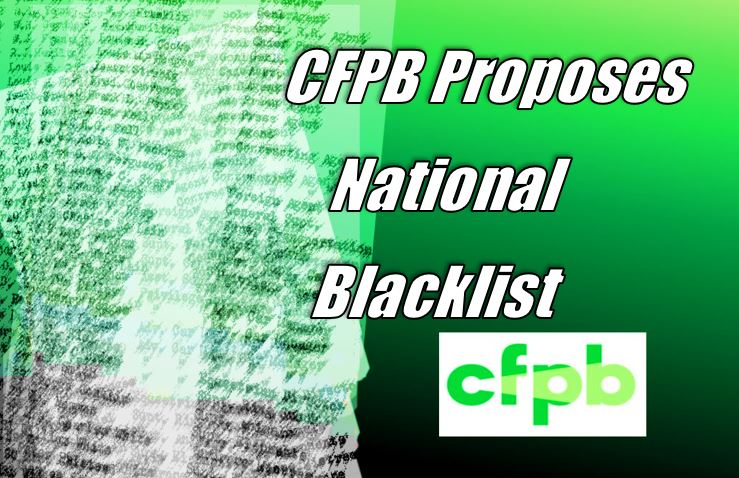
On Monday, the Consumer Financial Protection Bureau (CFPB), set forth a proposal to create a national registry to, as they say, “detect repeat offenders.” Offenders who they deem are a risk to American households because they have become subject to certain local, state, or federal consumer financial protection agency or court orders. As well intentioned as this may seem, it brings to question the legal process that the CFPB and other agencies employ. After all, the average person cannot afford to defend against their allegations without going into financial ruin.
Below is their proposal. You be the judge.
CFPB Proposes Registry to Detect Repeat Offenders
Registry of company and court order information will help the agency identify and mitigate risks to American households
DEC 12, 2022- WASHINGTON, D.C. – Today, the Consumer Financial Protection Bureau (CFPB) proposed requiring certain nonbank financial firms to register with the CFPB when they become subject to certain local, state, or federal consumer financial protection agency or court orders. The CFPB has further proposed to publish the orders and company information via an online registry.
Larger companies subject to the CFPB’s supervisory authority would be required to designate an individual to attest whether the firm is adhering to registered law enforcement orders. The CFPB’s proposed rule would help the agency identify and mitigate risks to American households and ensure that supervised companies perform their obligations to consumers.
“Protecting American households is a shared effort across local, state, and federal authorities,” said CFPB Director Rohit Chopra. “The proposed registry will help the CFPB, the law enforcement community, and the public limit the harms from repeat offenders.”
Congress, in creating the CFPB, tasked it with monitoring for risks to consumers in the offering or provision of consumer financial products and services and supervising the activities of certain nonbanks. Because the issuance of agency and court orders serves as one of the most important tools to pursue lawbreakers in these markets, it is important that the CFPB maintain a central repository of nonbanks subject to agency and court orders. The repository will allow the CFPB to track and mitigate the risks posed by repeat offenders, while also being able to monitor all lawbreakers subject to agency and court orders. The CFPB will share this powerful source of information with others, including with fellow regulators and law enforcement agencies, by making the registry public.
The registry will help unify the efforts of consumer financial protection enforcers, as well as provide the increased transparency and coordination that are critical to ensuring accountability and fairness in the marketplace. The CFPB’s proposal will enhance market monitoring and risk-based supervision efforts to ensure that the CFPB and its enforcement partners can identify previous lawbreakers and are positioned to take action to stop further large-scale harm or continued illegal efforts across the country.
In today’s rule, the CFPB is proposing:
- Covered nonbanks would report certain agency and court orders connected to consumer financial products and services: Generally, nonbanks would have to report final agency and court orders and judgments, including consent and stipulated orders, brought under federal consumer financial protection laws or state laws regarding unfair, deceptive, or abusive acts or practices.
- Larger supervised nonbanks would designate a senior executive to attest regarding the firm’s compliance with covered orders: Larger nonbanks that are supervised by the CFPB would be required to designate a senior executive to submit an annual supervisory written statement attesting to the steps taken to oversee the activities subject to the order and whether the executive knows of any violations of, or other instances of noncompliance with, the covered order.
In addition to publishing information about the agency or court order, the CFPB is considering publication of certain registration information about the company via release on the CFPB’s publicly available website.
While the CFPB might later consider collecting or publishing the information described in the proposal from insured banks and credit unions, there is currently greater need to collect this information from nonbanks under its jurisdiction. Among other things, the identity and size of all insured banks and credit unions are known to the CFPB. Also, there are only four federal prudential regulators for insured banks and credit unions, and they regularly publish their consumer financial protection orders. In contrast, comprehensive, readily accessible information is lacking about the identity of orders issued against nonbanks subject either to the CFPB’s market monitoring authority or to its supervisory authority across the various markets for consumer financial products and services.
Public input will inform revisions to the regulation text. The deadline for submitting comments is 60 days after publication in the Federal Register.
Consumers can submit complaints about financial products and services by visiting the CFPB’s website or by calling (855) 411-CFPB (2372).
###
The Consumer Financial Protection Bureau is a 21st century agency that implements and enforces Federal consumer financial law and ensures that markets for consumer financial products are fair, transparent, and competitive. For more information, visit consumerfinance.gov.










